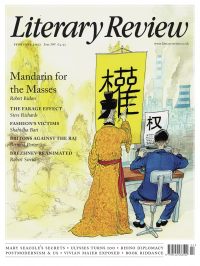Literary Review: Everything, All the Time, Everywhere: How We Became Post-Modern
In Literary Review, Jane O'Grady reviews Stuart Jeffries' Everything, All the Time, Everywhere: How We Became Post-Modern:
Everything, All the Time, Everywhere conveys the
essence of postmodernism (or lack of it) through an appropriately
postmodern bricolage – a patchwork of events, buildings, photographic
and enacted artworks, philosophies, films, technologies and video games.
Three examples are allocated to each of the ten chapters, which are
ordered chronologically and cover the period from 1971 to 2001. The Sex
Pistols, Margaret Thatcher and Lyotard co-feature as punk icons in the
third chapter, ‘No Future’; in the seventh, which focuses on 1989, when
the Soviet bloc collapsed, Jeffries juxtaposes Francis Fukuyama’s notion
of ‘the end of history’ with Judith Butler’s 1990 Gender Trouble (which marked the rise of queer theory) and the fatwa issued against Salman Rushdie for his novel The Satanic Verses.

Comments
Post a Comment